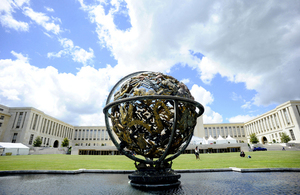Human Rights Council 36: Human Rights in Somalia
This UK statement was delivered at the 36th session of the Human Rights Council during the Interactive Dialogue with the Independent Expert on Somalia on 27 September 2017.

The Human Rights Council takes place at the Palais des Nations in Geneva
The United Kingdom thanks the independent expert on Somalia for his work and strongly supports the extension of his mandate. We welcome the recommendations contained in his report and emphasise the importance of swift progress in implementing the commitments made at the London Somalia Conference this May.
We note the progress observed in the Independent Expert’s report in developing the basis for the protection of human rights in the future, particularly through progress made in governance and peace building processes and notably the 2016/17 electoral process and the peaceful transfer of power. We commend the increase in the number of women members of parliament in Somalia.
There remains much to be done however, to address what remain serious violations and abuses, and a culture of impunity. We remain deeply concerned about civilian casualties and the vulnerability of displaced people, refugees and migrants; sexual and gender-based violence; restrictions on journalists and freedom of expression; and the continued use of the death penalty.
We urge the Somali authorities to implement existing commitments swiftly, including those to improve accountability for human rights abuses, and to support security institutions and forces to provide protection in accordance with international humanitarian and human rights standards. In this regard, the Federal Government of Somalia must take the steps necessary to ensure the effective operation of the Human Rights Commission.
We also call for further efforts to strengthen, ratify and implement the necessary policy and legislation to promote and protect the rule of law and human rights, particularly for women, children and those in vulnerable situations.